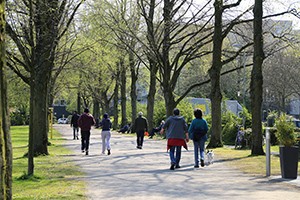
Communiversity helps walkers prevent pain and improve their posture
Walking is a great exercise, mode of transportation and activity most people do on a daily basis. Yet the more we walk, the more likely we were to develop habitual patterns of walking that cause musculoskeletal wear and tear while dulling our sense of self-agency. Many walkers are not attuned to the physical principles at work and unconsciously employ too much muscular effort or place unnecessary stress on joints. This often leads to fatigue, wear and tear, poor posture and other problems.
While most people learned to walk as babies or toddlers, it's never too late to improve your gait with a technique that has long been lauded for years by the performing arts community and athletes alike. It's called the Alexander Technique.
"The Alexander Technique re-teaches us how to use our own bodies," said Claire Rechnitzer, a certified Alexander Technique teacher. "The Alexander Technique, affectionately referred to as 'driving lessons for the human vehicle' can help people regain a strong 'feel for the road' so that we can respond to road\life conditions appropriately in real time." Rechnitzer said the Alexander Technique goes beyond mindfulness to teach mind-body learning that allows users to move and behave safely, efficiently and enjoyably. It has research-proven pain-management applications, can alleviate anxiety and can prevent injuries. She teaches how to put a spring in your step and stride with more momentum to make walking as easy and efficient as possible in the University of Cincinnati Communiversity course
.
aims to make participants experience walking in a way that makes them feel lighter, taller, smoother and steadier. Students will reap all the benefits that walking can offer and learn to lighten their load. Grab some walking shoes and join Communiversity for this outdoor, on-the-go lesson. The class meets at UC Victory Parkway campus, where Rechnitzer will cover some simple functional anatomy that everyone should know, experience structurally supportive body mechanics and learn easy tips to improve gait and endurance. Then students will put to practice what they have learned in a walk around Eden Park.
meets on May 5 from 9 to 10:30 a.m. and the course fee is $35. Students should dress for the weather and bring a small backpack or cross body bag for water, sunscreen and sunglasses.
"The Alexander Technique differs from other therapeutic treatments and fitness regimens in that it is essentially a process of self-discovery that empowers people to tackle everyday challenges and ambitions," Rechnitzer said. "Anyone interested in the way their own body works and functions finds the technique fascinating and useful in unparalleled ways." Alexander Technique lessons provide an opportunity to unwind and get to know how your body and mind work as your instructor guides you through common activities such as sitting, bending and walking. This technique is used widely by actors, dancers, athletes and equestrian riders.
Communiversity is offering a six-week introductory course into the
Alexander Technique for Posture, Poise and Performance
at the Carnegie Center of Columbia Tusculum on Thursday evenings starting April 12 from 6:30 to 8:30 p.m.
Rechnitzer also teaches how to improve posture with the
workshop. The course aims to eliminate slouches, text neck, Blackberry thumb, screen squint, selfie elbow and any of the other all-too-cute labels for chronic back, neck, wrist, jaw or shoulder aches and inflammations due to misuse or overuse of mobile devices.
Participants of
will practice smart ways to engage with various devices, learn how to improvise ergonomic support, demonstrate key functional anatomy details through firsthand experience, and cultivate the posture-saving body intelligence that will spare aches and pains. Students may bring their phones, tablet, eReader or even a laptop (especially those who experience wrist pain with using a mouse). Health professionals are encountering tech-related health complaints in younger and younger people, so this workshop will be fun enough for teens too. Bring yours along and they will get a special discount on the workshop.
takes place on April 23 from 6:30 to 8:30 p.m. on UC's Victory Parkway Campus. The course fee is $35. Students should bring their eyeglasses and lap desk if they use them. Children under 16 may register for a discounted rate of $10 if accompanied by an adult.
Rechnitzer is has been teaching individuals and group lessons in the Alexander Technique for more than a decade. Having been introduced to the Technique over 25 years ago, she has benefited from it by learning how to prevent persistent backache and overcome discomfort during pregnancy and parenting. Rechnitzer is a member of the American Society for the Alexander Technique and an award-winning writer about the technique. Seeing the technique help people from all walks of life fuels her passion to promote Alexander Technique awareness and practice as widely as possible.
Communiversity offers fun and innovative continuing education courses to enrich the lives of those around Cincinnati and beyond. With locations both on UC Victory Parkway Campus and around Cincinnati, Communiversity makes it easy for working professionals, retirees, and other lifelong learners to develop new skills and hobbies.
To register for Rechnitzer's or any other UC Communiversity course, visit our website at
.
Related Stories
Julie Leftwich appointed Director of International Peace and...
April 18, 2024
Julie Leftwich appointed Director of International Peace and Security Initiatives at the University of Cincinnati College of Law.
UC Law professor’s article named a Dukeminier Award recipient
April 18, 2024
Professor Ryan Thoreson's law review article named a Dukeminier Award recipient.
WLWT: Tips to fight off bad allergy symptoms
April 18, 2024
The University of Cincinnati's Ahmad Sedaghat spoke with WLWT about how Cincinnati's geography tends to make allergy symptoms worse and tips to fight off those symptoms.
